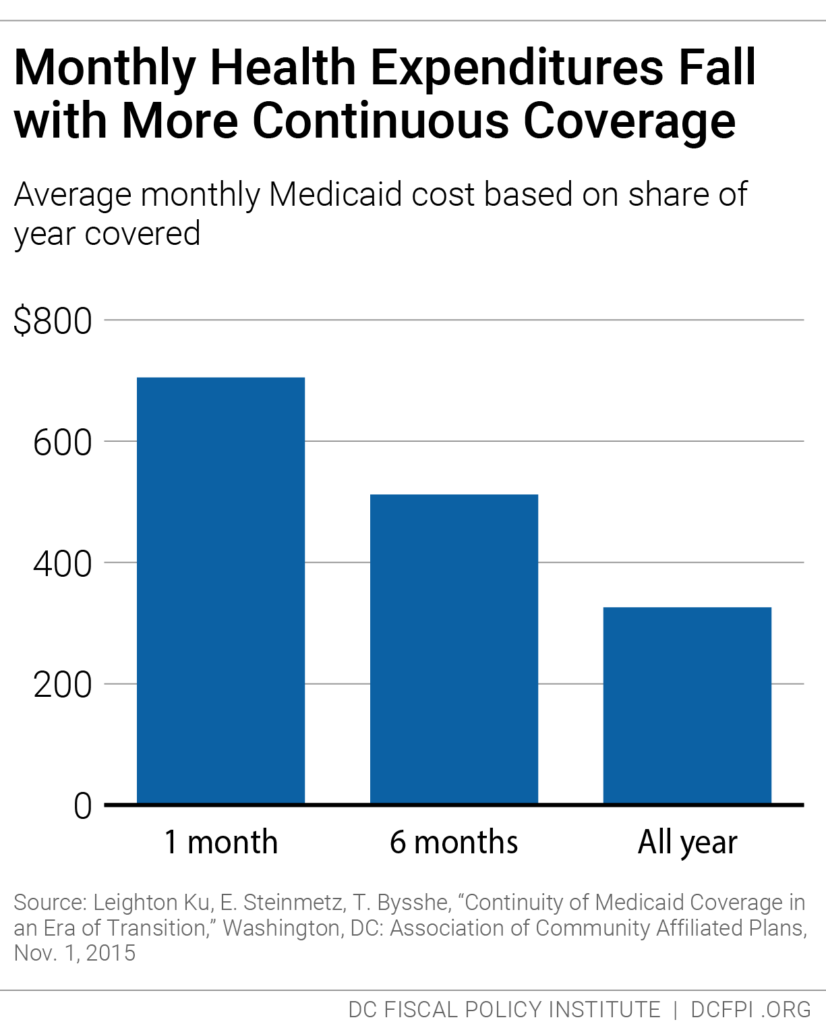CONTACT: Simone Holzer 202-325-8775 sholzer@dcfpi.org
DC imposes barriers to accessing health care through the DC Healthcare Alliance, a program that primarily serves immigrants, contributing to both poor health outcomes and unnecessarily high program costs, according to a new analysis by the DC Fiscal Policy Institute.
The main barrier, a requirement to renew eligibility every six months, contributes to a turnover, or “churn,” that approaches 50 percent every six months. This inconsistent health care coverage appears to be a key factor in the program’s poor outcomes and in costs that have doubled in just four years.
Since October 2011, DC has required participants in the DC Healthcare Alliance to re-enroll every six months to maintain eligibility. By contrast, most DC benefit programs require recertification once a year and allow renewals by mail or online. Research confirms that frequent recertification requirements in health care programs create a high rate of churn, and DC’s findings are no exception. Data from the Department of Health Care Finance show that in recent years, 45 percent of Alliance participants did not complete their recertification. Given that many Alliance members are working at jobs without paid leave and that visiting a social service center can take an entire day or longer, it is not surprising that many do not renew their benefits.
DCFPI’s analysis finds that this churn increases the program’s costs because it limits access to preventive care, which means participants are sicker when they re-enroll, and because the residents most willing to go through the process of maintaining coverage are those with the greatest health needs. DCFPI notes that Healthcare Alliance costs have doubled in the past four years, even though participation has not grown.
According to the report, No Way to Run a Healthcare Program: DC’s Access Barriers for Immigrants Contribute to Poor Outcomes and Higher Costs, replacing the six-month in-person Alliance requirement with one-year recertification would improve health outcomes for DC’s immigrants and reduce monthly program costs as residents receive better care and as healthier residents, currently discouraged from staying on, are able to maintain coverage.
“Ensuring greater continuity of care helps both patients and providers, can improve health and leads to lower average monthly costs,” said Leighton Ku, a professor of public health at George Washington University.
“Alliance beneficiaries battle extremely long lines and wait times when they attempt to recertify their coverage at DHS service centers,” said Chelsea Sharon, Senior Staff Attorney at Legal Aid Society. “Our clients—many of whom are elderly, struggling with disabilities, or caring for young children – report lining up as early as 3 or 4 a.m. and waiting outside for hours in biting cold or brutal heat before the service center doors open. This burden makes it extraordinarily difficult for even the most dedicated Alliance beneficiaries to successfully recertify and retain their coverage.”
The DC Council adopted legislation in 2017 to replace the six-month requirement, but it has not been implemented because the Mayor and Council have not yet identified the funding needed to serve the thousands of residents expected to receive coverage as a result of the change. DC’s Chief Financial Officer estimated that implementation would cost $27 million per year, based on the current average per-person cost of care in the Alliance. DCFPI notes that costs would likely be lower, as wider participation and enrollment of healthier residents brings costs down.
“Requiring Alliance participants to re-enroll every six months is like requiring everyone to show up at the DMV twice each year to keep a driver’s license,” said Ed Lazere, Executive Director of the DC Fiscal Policy Institute. “We need to make it easier for immigrants to access health care, not harder.”
###

